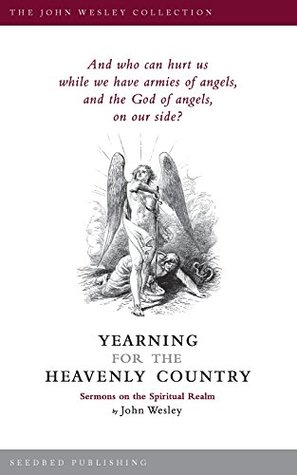John Wesley described the Christian life as consisting of “continual warfare.” The spiritual struggle involved in faithful living is real, in Wesley’s view. It means that we need “every moment” to be watchful and to pray so that we don’t fall into the temptations that surround us at every turn. Because the Christian life is a spiritual life, it intersects with the spiritual realm. For Wesley, our own spirits are under the influence of spirits we can’t see with our eyes—the Holy Spirit, of course, but also angels and demons that seek to do us either good or ill.
John Wesley described the Christian life as consisting of “continual warfare.” The spiritual struggle involved in faithful living is real, in Wesley’s view. It means that we need “every moment” to be watchful and to pray so that we don’t fall into the temptations that surround us at every turn. Because the Christian life is a spiritual life, it intersects with the spiritual realm. For Wesley, our own spirits are under the influence of spirits we can’t see with our eyes—the Holy Spirit, of course, but also angels and demons that seek to do us either good or ill.Well known for his “practical divinity,” or writings on the practical Christian life, Wesley was also wont to venture into more speculative territory when it came to his writing on spiritual warfare. He was fascinated by the role that angels play in our faith. He believed strongly that we needed to be aware of the danger that Satan and his demons represented to us. Wesley could also become captivated by thoughts on what the “heavenly country” from the book of Hebrews might be like—a restored creation for a redeemed humanity in the kingdom to come. This volume covers all that ground as we have it from Wesley’s pen, with twelve sermons on the spiritual life and the spiritual realm that are both practical and speculative in nature.
Well known for his “practical divinity,” or writings on the practical Christian life, Wesley was also wont to venture into more speculative territory when it came to his writing on spiritual warfare. He was fascinated by the role that angels play in our faith. He believed strongly that we needed to be aware of the danger that Satan and his demons represented to us. Wesley could also become captivated by thoughts on what the “heavenly country” from the book of Hebrews might be like—a restored creation for a redeemed humanity in the kingdom to come. This volume covers all that ground as we have it from Wesley’s pen, with twelve sermons on the spiritual life and the spiritual realm that are both practical and speculative in nature.BUY NOW
Published December 1st 2016 by Seedbed

John Wesley (1703 - 1791)
Was an Anglican cleric and Christian theologian. Wesley is largely credited, along with his brother Charles Wesley, as founding the Methodist movement which began when he took to open-air preaching in a similar manner to George Whitefield. In contrast to Whitefield's Calvinism, Wesley embraced the Arminian doctrines that were dominant in the 18th-century Church of England. Methodism in both forms became a highly successful evangelical movement in Britain, which encouraged people to experience Jesus Christ personally.Wesley helped to organise and form societies of Christians throughout Great Britain, North America and Ireland as small groups that developed intensive, personal accountability, discipleship and religious instruction among members. His great contribution was to appoint itinerant, unordained preachers who travelled widely to evangelise and care for people in the societies. Under Wesley's direction, Methodists became leaders in many social issues of the day, including the prison reform and abolitionism movements.
John Wesley was an Anglican cleric and Christian theologian. Wesley is largely credited, along with his brother Charles Wesley, with founding the Methodist movement which began when he took to open-air preaching in a similar manner to George Whitefield. In contrast to George Whitefield's Calvinism (which later led to the forming of the Calvinistic Methodists), Wesley embraced Arminianism. Methodism in both forms was a highly successful evangelical movement in the United Kingdom, which encouraged people to experience Christ personally.
Wesley believed that this doctrine should be constantly preached, especially among the people called Methodists. In fact, he contended that the purpose of the Methodist movement was to "spread scriptural holiness across England."
Throughout his life, Wesley remained within the Church of England and insisted that his movement was well within the bounds of the Anglican tradition. His maverick use of church policy put him at odds with many within the Church of England, though toward the end of his life he was widely respected.
John Wesley was the founder of the Methodist movement which grew from the 'Holy Club' of his Oxford friends into a great religious revival. An indefatigable traveller, preacher and writer, Wesley averaged 8,000 miles a year on horseback and gave 15 sermons a week. The reluctance of the Anglican clergy to lend him their pulpits led him to give some of his sermons in the open air, a decision which enabled him to reach those among the poorer sections of society who were not accustomed to going to church.
... Show more